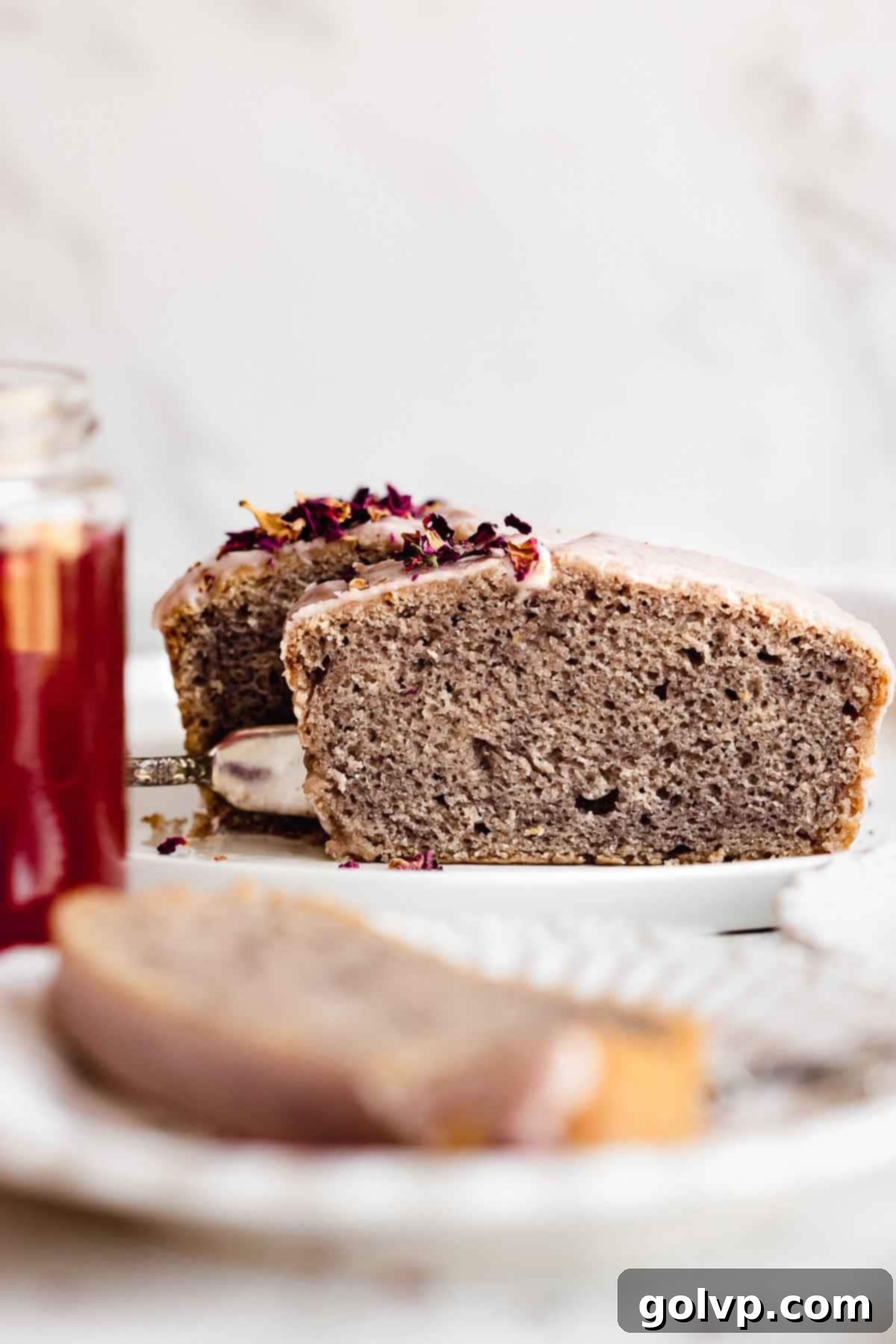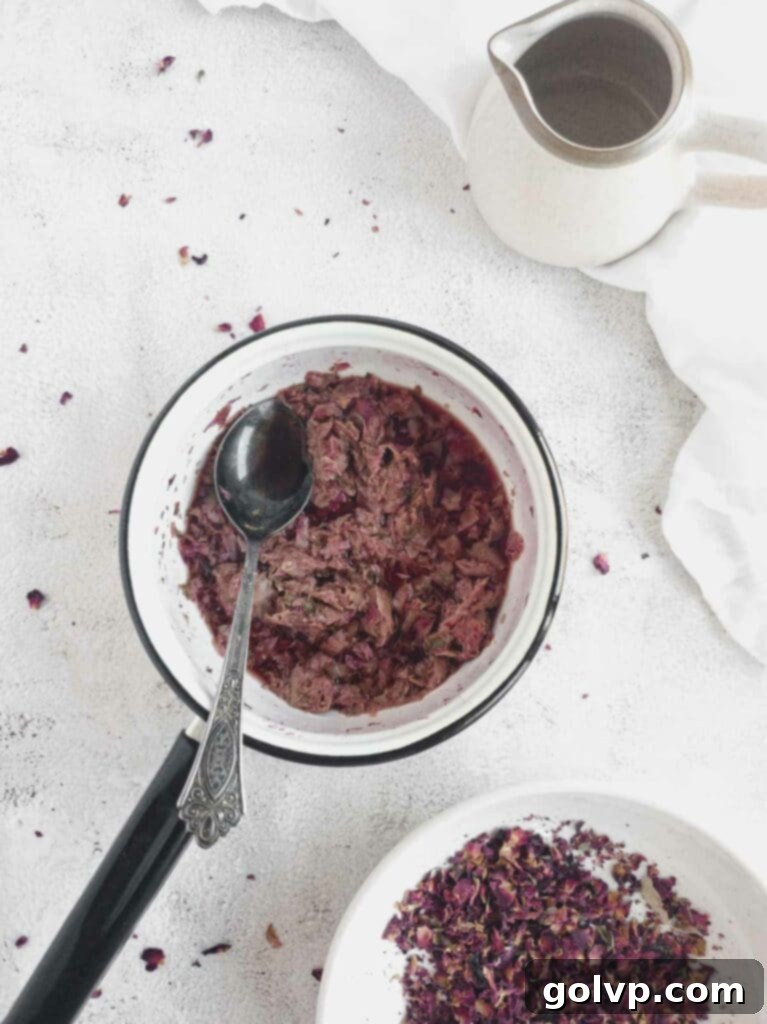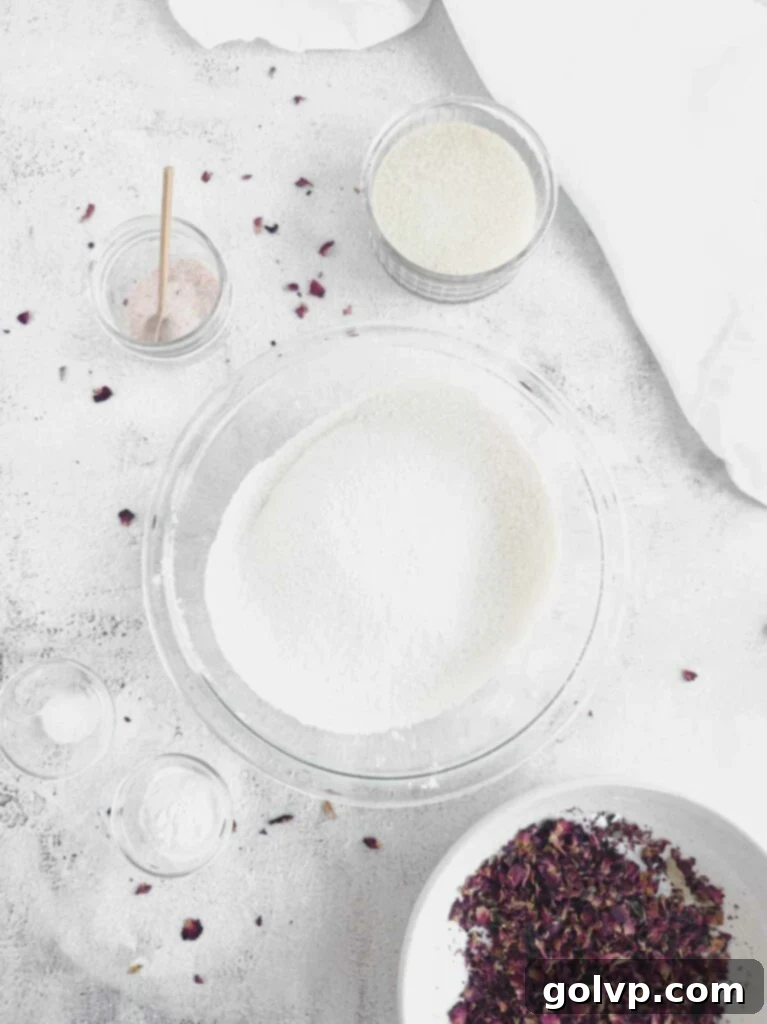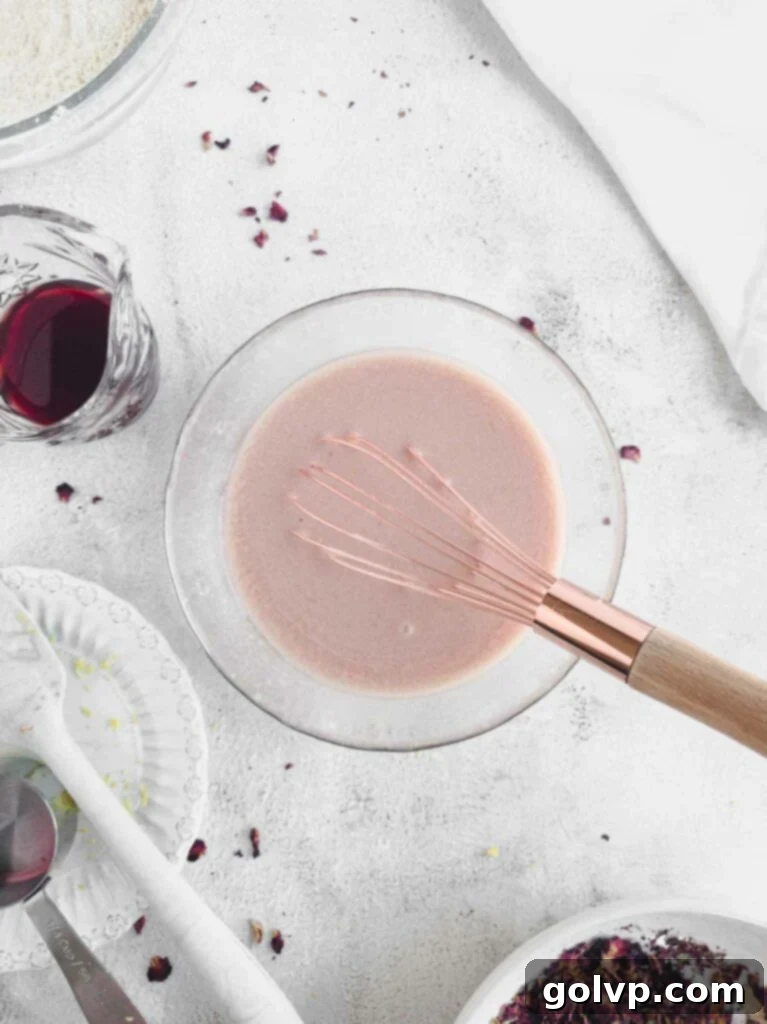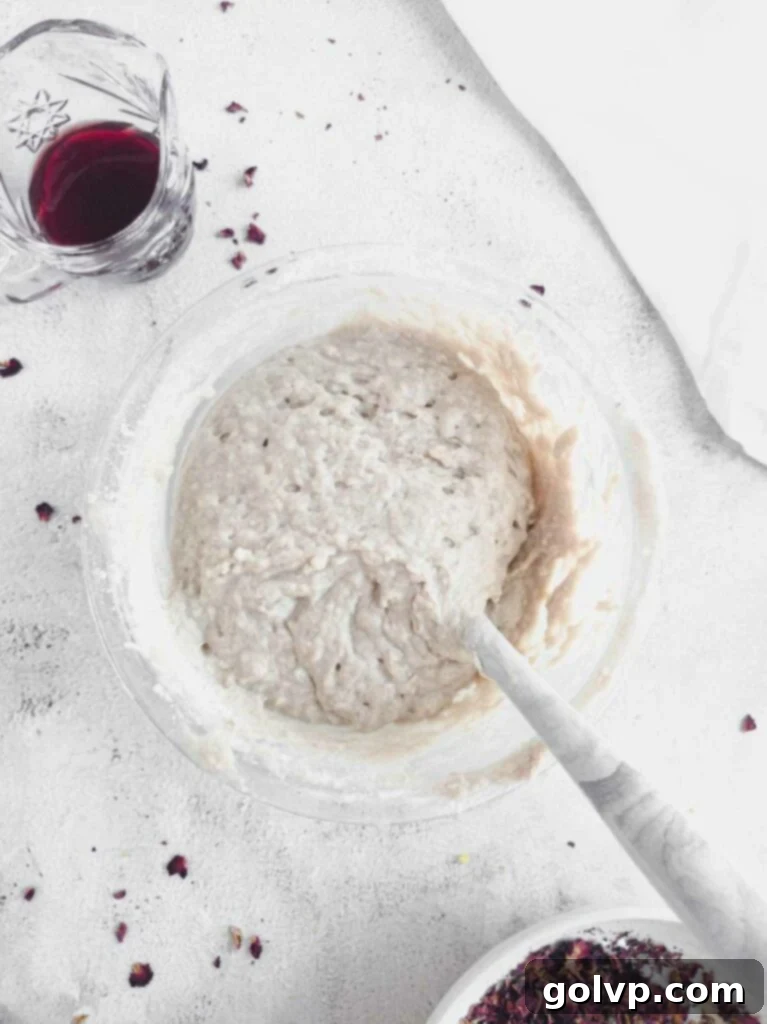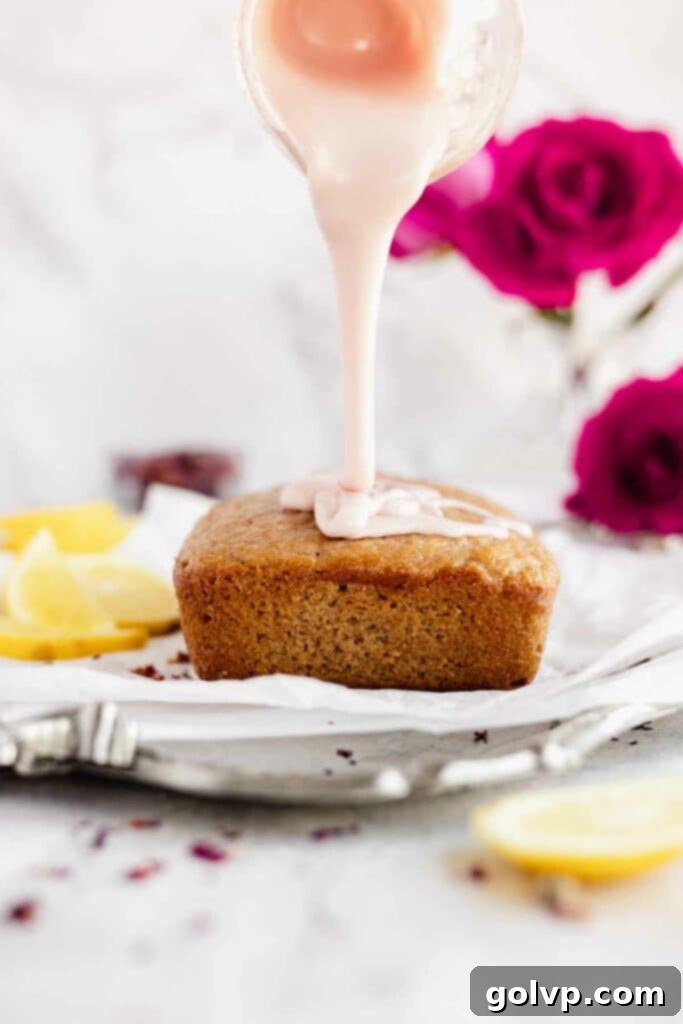Deliciously Moist Vegan Rose & Lemon Loaf Cake with Homemade Rose Water Glaze
Prepare to be enchanted by this exquisite vegan rose loaf cake. It’s a dessert that defies expectations, delivering a wonderfully soft, moist, and profoundly flavorful experience without a hint of its vegan nature. The secret lies in our handcrafted rose water, which imbues the cake with a delicate, authentic rose essence that is never overwhelming. This makes it a perfect treat even for those who typically find rose-flavored desserts too strong or “perfumey.” The subtle, bright notes of fresh lemon zest further elevate the profile, creating a harmonious blend that is utterly delightful for spring, summer, or truly, any time of the year you crave a touch of floral elegance.
Despite its sophisticated flavor, this vegan rose loaf cake is surprisingly simple to prepare. You won’t need any specialized equipment or even a hand mixer; just a couple of bowls and a whisk are enough. This recipe proves that you don’t need to be an experienced baker to create something truly magical. The ease of assembly ensures that anyone can whip up this stunning cake, leaving your guests utterly convinced you spent hours perfecting it. It’s our little secret! 😉
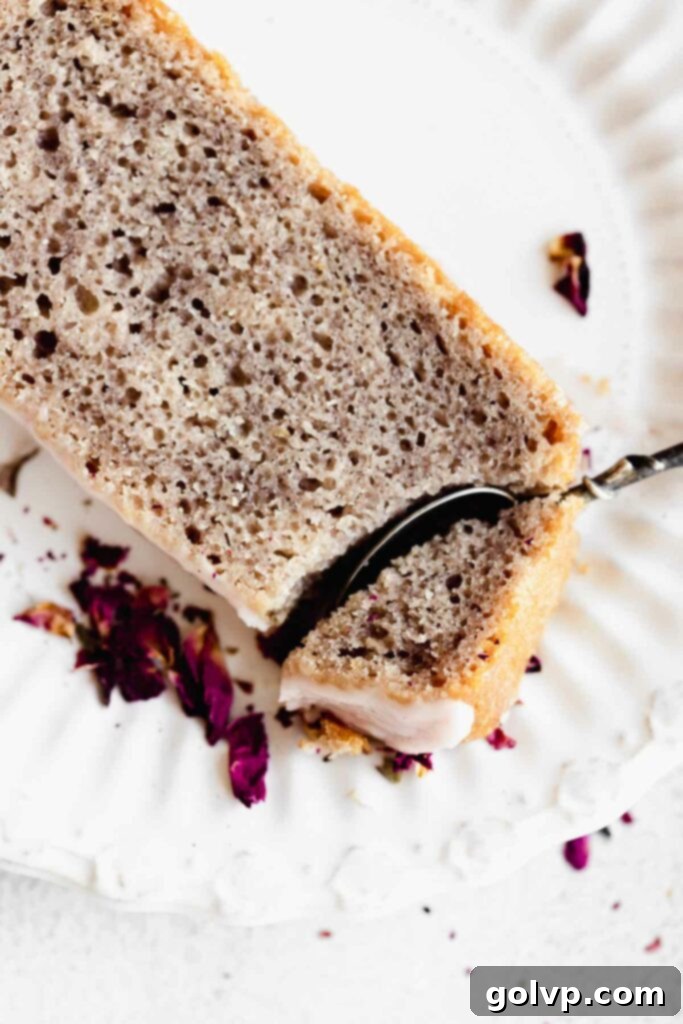
The Essence of Roses: Crafting Homemade Rose Water
The heart of this extraordinary loaf cake is the homemade rose water. Unlike many store-bought varieties that can taste artificial or overly concentrated, making your own ensures a pure, subtle, and truly authentic rose flavor. It also provides a beautiful, natural pale pink hue to both the cake and its accompanying glaze, a visual delight that artificial colorings simply can’t replicate.
Creating your own rose water is incredibly simple and rewarding. For this recipe, you’ll use high-quality dried rose petals to achieve a concentrated, aromatic infusion. Simply combine the dried rose petals with water in a small saucepan, bring it to a gentle simmer, and let it cook for about 5 minutes. After simmering, remove the pan from the heat and allow it to steep, covered, for another 10 minutes. This resting period is crucial as it allows the rose petals to fully release their vibrant color and delicate oils into the water, resulting in the petals becoming colorless. Once cooled, strain the liquid through a fine-mesh sieve, discarding the spent petals. Store this precious homemade rose water in a clean glass jar in the refrigerator, where it will stay fresh for up to one month, ready to elevate your culinary creations and more!
The advantages of crafting your own rose water are numerous, especially when it comes to baking. Firstly, the simmering process ensures that all the beautiful natural flavor compounds and the inherent delicate pink color from the rose petals are thoroughly infused into the water. This results in the loaf having a subtle, alluring pink hue and the glaze boasting a lovely pale pink shade, all without a single drop of artificial coloring. Homemade rose water offers a flavor profile that is far superior to most store-bought alternatives. It’s less overwhelmingly floral, steering clear of that “beauty product” taste often associated with commercial rose waters. This nuanced flavor is absolutely perfect for baking, allowing the rose essence to complement, rather than dominate, other ingredients. You’ll achieve a more authentic, gentle aroma and taste, making your baked goods truly stand out.
The quality of your dried rose petals directly impacts the flavor, aroma, and even the color of your homemade rose water and, consequently, your vegan rose loaf cake. I always prioritize using good quality, culinary-grade, sustainably sourced, and high-grade rose petals. This commitment to quality truly makes a discernible difference in the final product. Low-quality petals can result in a muted flavor, a less vibrant color, and even an undesirable, musty undertone. Fresh, vibrant petals, on the other hand, yield a bright, fragrant rose water that sings in the cake. The specific variety and origin of your rose petals can also influence the subtle nuances of the final flavor and aroma, so experiment with different sources to find your favorite.
When selecting dried rose petals for your homemade rose water, look for visual and aromatic cues that indicate freshness and quality. You want your rose petals to appear vibrant and bright in color, retaining some of their natural richness, not dull or faded. A strong, pleasant, and distinctly floral fragrance is key; they should smell very aromatic and inviting, not musty, flat, or like stale potpourri. Generally, the larger the pieces of petals, the better, as this often signifies less processing and higher quality. While it’s perfectly acceptable to find a few small leaves mixed in, there should be minimal or no woody twigs, which indicate lower quality and can impart undesirable flavors.
You’ll likely have a small amount of that beautiful homemade rose water left over, and there are many delightful ways to use it beyond this cake! For a refreshing culinary twist, mix a few drops into your tea, plain water, or lemonade to impart a lovely floral scent and a subtle, delicate flavor. Remember, it’s concentrated, so a little goes a long way to avoid bitterness. Beyond the kitchen, rose water is also wonderful for personal care. You can dilute it with distilled water and transfer it to a spray bottle to create your own refreshing and toning face mist. It’s also known for its soothing properties and can make a lovely, natural linen spray or room freshener. Its versatility makes it a fantastic addition to any home.
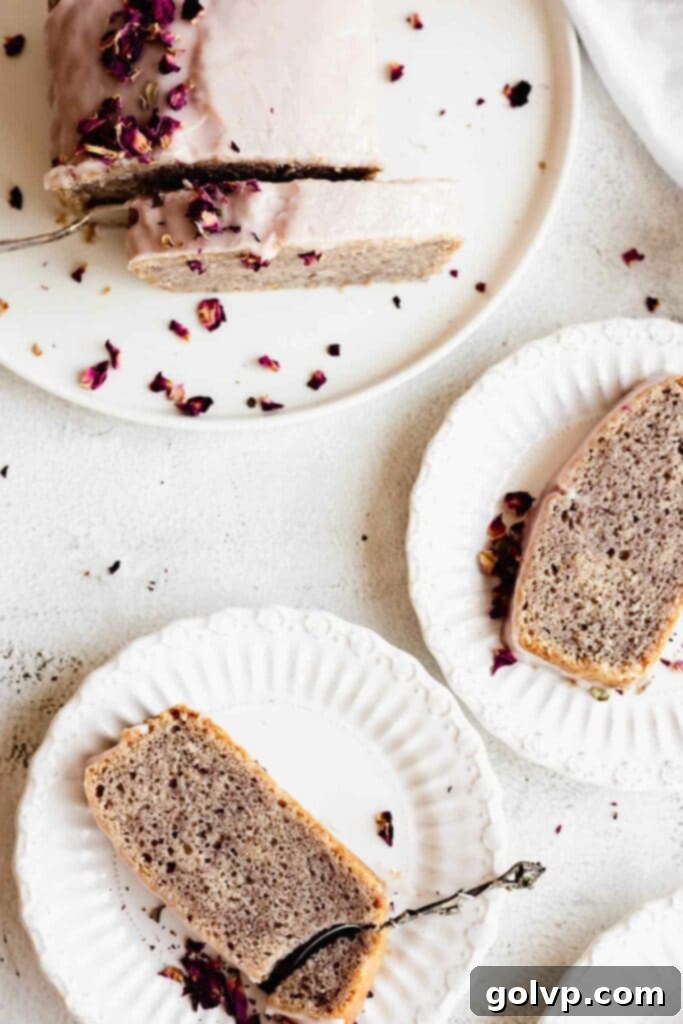
🌹 Sourcing Your Dried Rose Petals for Optimal Flavor
Finding high-quality dried rose petals is paramount to achieving the best possible flavor in your vegan rose loaf cake. I was fortunate enough to source my petals from my local Naturopathic doctor at Georgina Naturopathic. For me, it’s incredibly important that the rose petals are picked at their peak maturity, responsibly sourced, meticulously clean, and ideally purchased locally. These are precisely the kind of botanicals that Doctor Yulia, with her extensive knowledge, procures for her clinic. Her establishment feels like a modern-day apothecary, offering a wide array of herbs suitable for both medicinal and culinary applications. If you’re in the area, I highly recommend paying her a visit!
If you’re not in the vicinity, don’t despair! You can still find excellent quality dried rose petals. Your best bet is to check with local herbalists, specialty spice shops, or even well-stocked health food stores. When buying online, always look for reputable suppliers who specify “culinary grade” or “food grade” rose petals to ensure they are safe for consumption and free from pesticides. Reading reviews and checking for certifications can also help. Remember, the quality of these petals truly makes all the difference in the delicate aroma and nuanced flavor of this vegan rose loaf cake, transforming it from a good dessert to an unforgettable one.
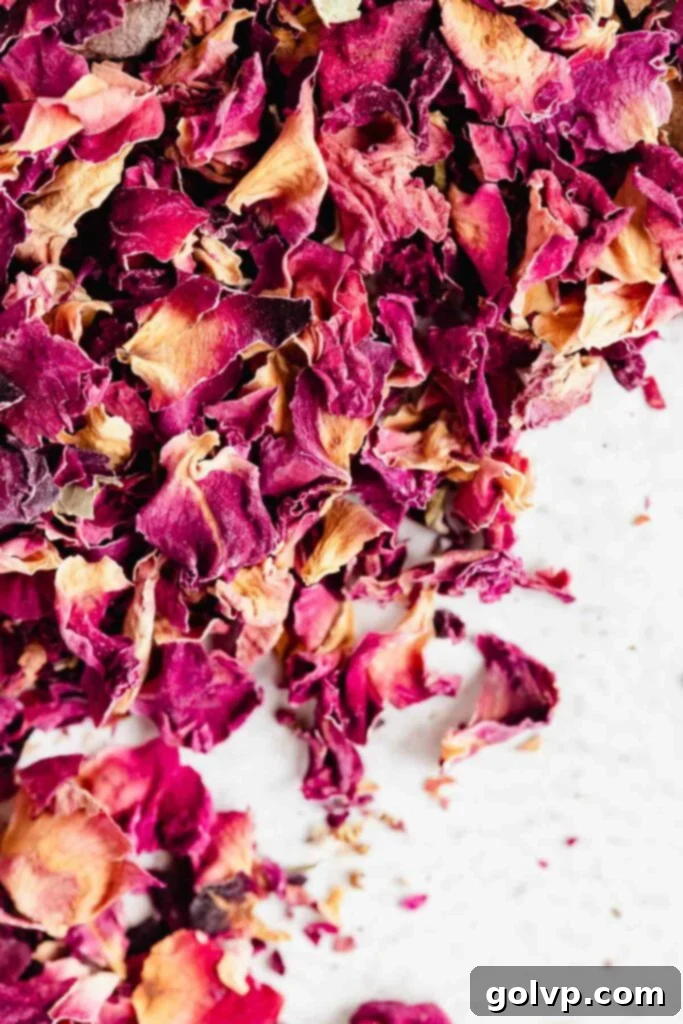
Discover More Vegan & Dairy-Free Delights:
- Vegan Carrot Cake with Cashew “Cream Cheese” Frosting
- Sharlotka Apple Cake
🔪 Key Ingredients for Your Vegan Rose Loaf Cake
Each ingredient in this recipe plays a crucial role in creating the perfect texture, moisture, and flavor profile. Let’s delve into what makes this vegan rose loaf truly special:
- Good Quality Rose Petals: As discussed, these are absolutely essential for making your concentrated, homemade rose water. This naturally infuses the loaf cake and its glaze with an authentic, gentle rose flavor that cannot be achieved with artificial extracts. Opt for culinary-grade, organic petals for the best results.
- All-Purpose Flour: This provides the primary structure for your loaf cake. If you’re looking for a gluten-free option, you can successfully substitute it with a 1:1 gluten-free flour blend. Just be mindful that using a GF blend may result in a slightly denser loaf, but it will still be delicious.
- Baking Powder and Baking Soda: These are your leavening agents, working in tandem to give the loaf its beautiful lift and airy, tender crumb. They create pockets of air during baking, ensuring a light and fluffy texture.
- Organic Granulated or Cane Sugar: Sugar not only provides sweetness but also contributes significantly to the cake’s moisture and tenderness. While you can substitute with brown or coconut sugar, be aware that their stronger caramel notes might subtly overpower the delicate rose and lemon flavors, altering the intended profile.
- Milk of Choice (Dairy-Free): Any neutral-flavored plant-based milk will work wonderfully here. Almond milk or oat milk are excellent choices as they contribute to moisture without adding strong competing flavors. Ensure it’s unsweetened if possible, to control the sugar content.
- Dairy-Free Yogurt of Choice: This is a superstar ingredient for vegan baking! It’s vital for adding depth of flavor, incredible moisture, and contributing to that wonderfully bouncy, soft texture that makes this loaf so satisfying. I’ve had great success with oat yogurt, but any plain, unsweetened dairy-free yogurt will do. Choosing one with probiotics can also add an extra health benefit!
- Melted Refined Coconut Oil: This fat is crucial for richness and moisture. Refined coconut oil is preferred because it’s flavorless, allowing the delicate rose and lemon notes to shine. If unavailable, neutral-flavored oils like canola oil, vegetable oil, or a light olive oil can be excellent substitutes. Avoid unrefined coconut oil or strongly flavored oils that could impart an unwanted taste.
- 1 Large or 2 Medium Lemons: You’ll be using both the zest and the juice from these lemons. The lemon zest provides aromatic oils that brighten the overall flavor, adding a sunny counterpoint to the floral rose. The fresh lemon juice contributes acidity, which reacts with the baking soda to aid in leavening and also adds a refreshing tang that beautifully complements the rose.
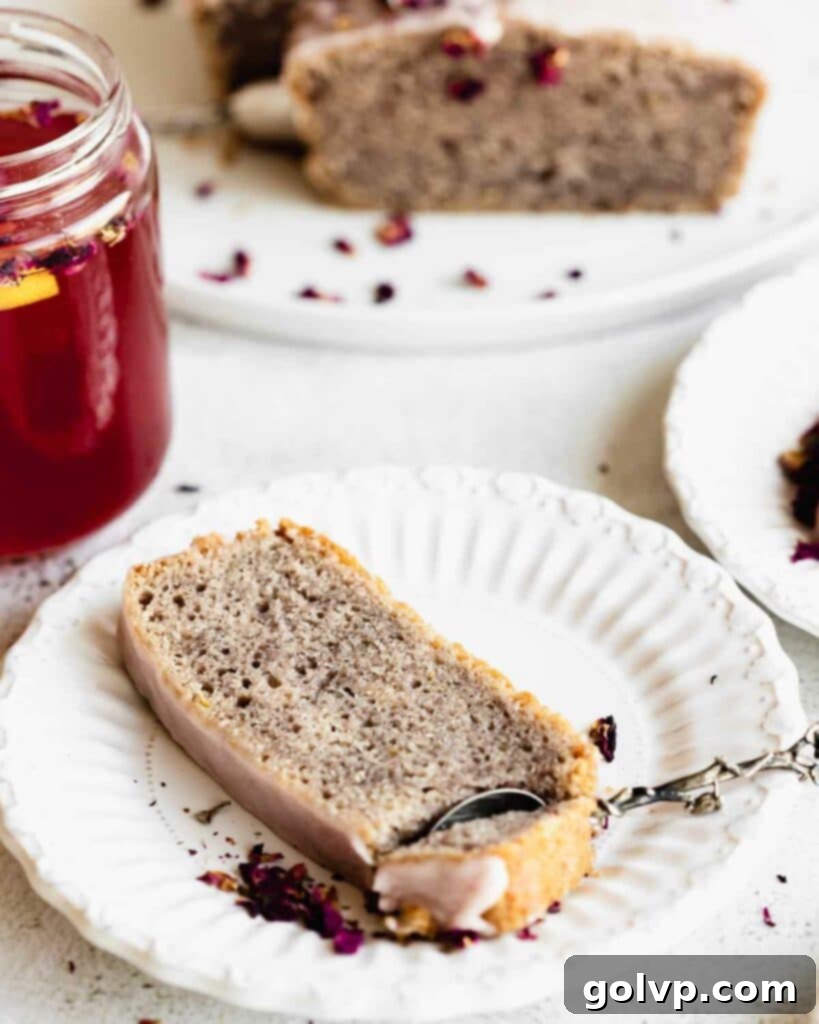
Simple Steps for a Perfect Vegan Rose Loaf
Baking this delightful vegan rose loaf cake is a straightforward process, even for beginners. Follow these easy steps to achieve a perfectly moist and fragrant dessert:
- Prepare the Homemade Rose Water: Begin by combining your good quality dried rose petals with filtered water in a small saucepan. Bring this mixture to a gentle simmer, cover, and allow it to steep for the recommended time. This ensures maximum flavor and color extraction. Once done, strain the liquid and set it aside to cool completely before incorporating it into the cake batter.
- Prepare Dry Ingredients: In a large mixing bowl, sift together all the dry ingredients, including the all-purpose flour, baking powder, baking soda, and salt. Sifting helps to aerate the flour and prevents lumps, ensuring an even texture in your final cake.
- Combine Wet Ingredients: In a separate bowl, whisk together the granulated sugar, your chosen dairy-free milk, dairy-free yogurt, melted refined coconut oil, the prepared homemade rose water, fresh lemon juice, and aromatic lemon zest. Ensure all these wet ingredients are well combined.
- Gently Combine Wet and Dry: Pour the wet ingredient mixture into the bowl containing the sifted dry ingredients. Using a whisk or spatula, gently mix just until everything is incorporated and no streaks of dry flour remain. Be careful not to overmix, as this can lead to a tough loaf. A few small lumps are perfectly fine.
- Bake to Perfection: Transfer the batter evenly into your prepared loaf pan. Bake for approximately 50-55 minutes in a preheated oven. The cake is ready when a toothpick inserted into the center comes out clean or with only a few moist crumbs attached. Avoid opening the oven door too early to prevent the cake from sinking.
- Prepare the Rose Glaze: While your beautiful loaf cake is cooling (it needs to be completely cool before glazing!), you can prepare the simple rose glaze. Sift icing sugar into a bowl and gradually whisk in the remaining homemade rose water until you achieve a smooth, pourable, yet thick consistency.
- Glaze, Slice & Serve: Once the loaf cake has fully cooled, carefully invert it from the pan onto a serving plate or wire rack. Generously pour the prepared rose glaze evenly over the top, letting it drip down the sides. Allow the glaze to set for about 5-10 minutes before slicing into thick, delicious pieces. Serve immediately and enjoy!
Happy baking! We hope you adore this unique and flavorful vegan rose loaf cake as much as we do. It’s a true testament to the beauty of plant-based baking, proving that vegan desserts can be just as, if not more, indulgent and delightful!
Did you make this recipe? We would absolutely love for you to rate this recipe and share your thoughts in the comments section below! Your feedback helps us and other bakers in our community.
Don’t forget to share your beautiful creation on Instagram and tag us @flouringkitchen. We can’t wait to see your masterpieces!
📖 Recipe
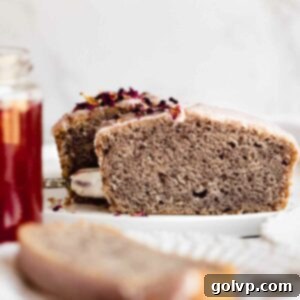
Vegan Rose Loaf
Mary
Pin Recipe
Shop Ingredients
Equipment
-
9″ by 5″ loaf pan
Ingredients
Rose Water
- ½ cup good quality rose petals
- 1 cup filtered water
Loaf
- ½ teaspoon vegetable oil for greasing
- 1 tbsp all purpose flour for greasing
- 2 cups+2 tablespoon all purpose flour
- 2 teaspoon baking powder
- ¼ teaspoon baking soda
- ¾ teaspoon salt
- ¾ cup granulated or cane sugar
- ½ cup milk of choice
- ½ cup dairy free yogurt of choice
- ¼ cup melted refined coconut oil
- ¼ cup rose water
- 1 teaspoon lemon zest
- ¼ cup freshly squeezed lemon juice from 1 large or 2 medium lemons
Rose Glaze
- 1 cup icing sugar
- 1 ½ tablespoon rose water use more or less to get desired consistency
Shop Ingredients on Jupiter
Instructions
Rose Water
-
Combine the dried rose petals and water in a small saucepan, cover, and bring to a simmer. Simmer gently for 5 minutes and let sit for 10 minutes, covered. The petals should look colourless and the water should be a bright reddish pink colour.½ cup good quality rose petals, 1 cup filtered water
-
Strain the rose water through a sieve and set aside to cool.
Loaf
-
Preheat oven to 180°C.
-
Grease the loaf pan with oil. Sprinkle the 1 tablespoon flour into the pan and tap to cover all sides. Shake excess out.½ teaspoon vegetable oil, 1 tablespoon all purpose flour
-
Sift the flour, baking powder, baking soda, and salt in a large bowl.2 cups+2 tablespoon all purpose flour, 2 teaspoon baking powder, ¼ teaspoon baking soda, ¾ teaspoon salt
-
In a separate bowl, combine the sugar, milk, yogurt, oil, rose water, lemon juice, and zest.¾ cup granulated or cane sugar, ½ cup milk of choice, ½ cup dairy free yogurt of choice, ¼ cup melted refined coconut oil, ¼ cup rose water, 1 teaspoon lemon zest, ¼ cup freshly squeezed lemon juice
-
Pour the wet ingredients into the dry and stir just until incorporated. Do not over mix.
-
Pour into the greased loaf pan and bake at 180°C for 50-55 minutes – until a toothpick inserted in the centre comes out clean.
-
Remove from oven and let cool inside pan. Flip the cake out once it is completely cooled.
Glaze
-
Sift the powdered sugar into a bowl1 cup icing sugar
-
Add 1 tablespoon rose water and whisk together. Add more rose water to thin it out if needed. Do not make it too thin, it needs to be thicker than glue consistency.1 ½ tablespoon rose water
-
Immediately pour the glaze over the loaf (it dries quickly) and let it set for 5 minutes before cutting into slices
-
Enjoy! Store refrigerated in an airtight container for up to 3 days. Freeze in an airtight container for up to 2 months. Let come to room temperature before serving.
Notes
- Add drops of rose water to lemonade, tea, or even water. The rose water will add a beautiful rose aroma and soft pink colour. Be careful of adding too much because it may taste bitter since it is a very strong concentrate.
- Add some rose water to a spray bottle diluted with water. Spritz on your face and neck as a refreshing and toning spray.
This blog post is sponsored by Georgina Naturopathic, who generously provided the high-quality rose petals that make this recipe shine. Support local businesses and herbalists for the finest ingredients!
